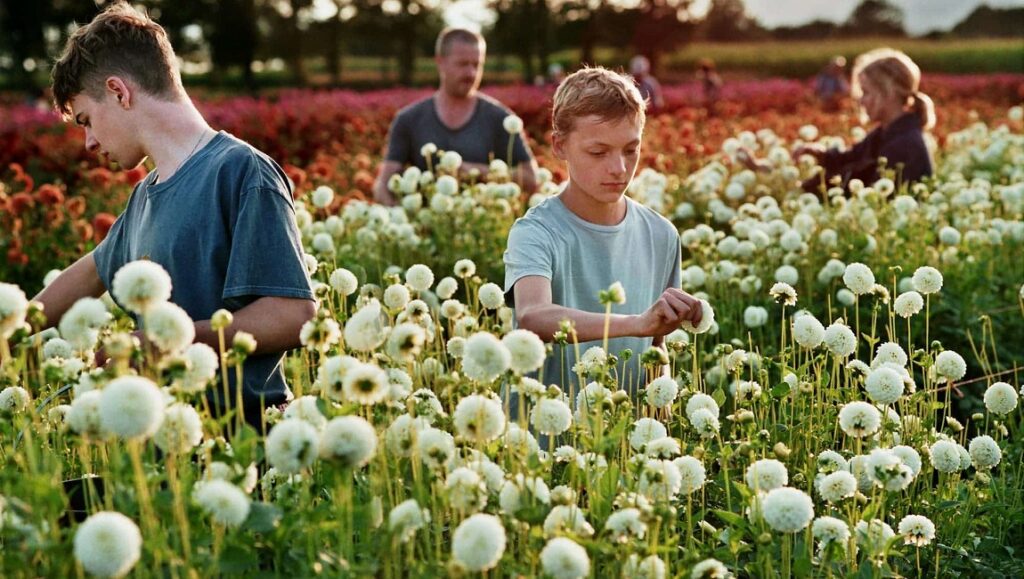Running through a field of brightly colored flowers might seem an awfully clichéd image of childhood innocence, but there is some hope that Lukas Dhont’s sophomore feature Close — about two young boys whose relationship is too intimate for themselves or anyone else to understand — will complicate this simple and idyllic image, because soon after this sequence we witness the labor that goes into this field. Dhont doesn’t allow it to only exist as an abstraction or metaphor; it’s, conversely, a place in the real world that needs work and effort to maintain. This complication is realized with a lightness of touch that extends to the lead performances, which allows the ambiguities between Léo (Eden Dambrine) and Rémi (Gustav De Waele) to clearly surface: that there is something more between these childhood friends is obvious, but what exactly that is is quite far from articulated, both for the audience and themselves.
But this is only a trick of the light. Dhont’s handheld camera and its shallow depth of field strain to convince of an immediacy and realism that belies the true banality of his vision: when the boys fall out, he shows the flowers being harvested by a loud, scary machine in the darkness of night, and when things start to heal, he presents the image of a baby. It seems that the shot of labor was purely incidental, and that loosely connected abstraction continues its reign. This is equally clear in Dhont’s debut, Girl, which has nothing other than a few of these visual metaphors which it shuffles around into different orders for a hundred minutes. Close does have some dramatic drive, at least temporarily. The boys don’t really get time to drift apart because as soon as one girl asks, fairly neutrally, if they are a couple, Léo starts to turn his back on Rémi.
Their relationship doesn’t have to be worn down because Dhont imagines childhood innocence in an even wispier way than that first image suggests: it’s so fragile that even the lightest touch from the outside world can cause it to crumble instantly. It’s as if before the age of thirteen, they were hermetically sealed, not just from the world of adults, of relationships and sexuality — which would make some sense in this queer context, since those possibilities are often hidden away — but also from any social force at all, since such a small dose has yielded such dramatic effect. By the 30-minute mark, Léo and Rémi are glancing at each other from afar with looks of pain, anger, and longing for what might have been; they’ve reached the natural endpoint of their story, at least if it were as concerned with realism as the film’s visual style is desperate to suggest.
It seems that all Dhont has left to do is throw in a shocking twist, much like he did in Girl, the specifics of which don’t bear repeating other than to say it’s exactly the ending an ignorant cis man would give to his movie about a young trans woman; it might have been even more offensive than it already is if it weren’t so deeply stupid. That ugliness isn’t as apparent in Close — it is a story much closer to Dhont’s own experiences, so he doesn’t have to stretch so far into callous presumption — but it’s still very much present. [SPOILER] As soon as Léo finds out that Rémi has committed suicide, it becomes clear that Dhont isn’t interested in it beyond the shock value it provides.
Of course, there’s always some mystery around suicide and seldom some big reason to explain it away, but it’s not like the film is doing anything else instead of exploring it: all the more mysterious when it seems to be going out of its way to avoid it. Dhont almost lets the audience believe it was Léo’s fault, and maybe the director would argue that that aligns us with him, that he’d probably feel guilty no matter what, but if that’s the case, then it’s quite impossible not to notice that process; partly because it’s so clumsily done, but mostly because no sensible person would really believe that Léo was the sole cause. There might be something truthful in the way that Léo heals slowly and without revelation, but it pushes Rémi even further out of focus, his death as only a means to an end. And that end is smuggling emotional weight into the second half’s banal scenes of Léo sadly wandering around as the most godawful musical melancholia — the kind typical of those cynically “emotional” adverts — blasts over the soundtrack, trying to engender emotion through brute force.
Dhont wants to tell stories of inner turmoil, but he has no sense for, or interest in, interiority, and that’s part of why he latches onto the body in Girl. But if Close seems an improvement on Girl, it’s only because it’s better at hiding its insufficiencies without replacing its callousness and emptiness with anything because, well, Dhont has nothing to replace it with. How much of this could be attributed to malice and how much to a general lack of imagination doesn’t really matter, since it’s obvious that Dhont isn’t a filmmaker worth taking seriously. Based on the evidence he’s provided, only the most gullible could be convinced otherwise: anyone who would be moved by the final shot here, where Léo looks back before deciding to literally keep moving forward, has got the film they deserve.
Published as part of InRO Weekly — Volume 1, Issue 4.


Comments are closed.